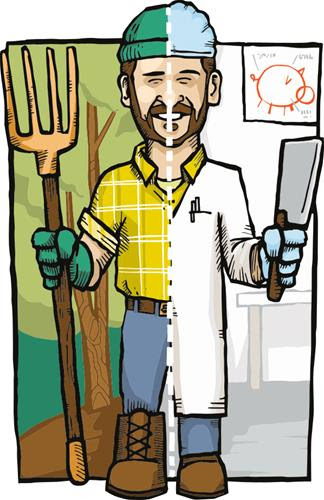Good winemakers often make wine from the grapes grown in their own vineyards. Excellent olive oils are most often pressed from the olives of a single estate’s groves. Farmstead cheeses, made only with the milk of the cheesemaker’s own herd, are revered at most good cheese counters. Being involved in every step of the process creates tastier food because the makers can tweak any part of the system. The cheesemaker that doesn’t like the way the milk is tasting can change the field where the animals are grazing or adjust their supplemental feed. If recent heavy rains have been watering down the milk, they can adjust the recipe.
But there are next to no “farmstead” meats.
There is almost nowhere in the US where the farm, the abattoir (slaughterhouse), and the curing room are all the same place. If all these other foods are made on the farm, why is it so rare to have farmstead bacon?
The short answer is regulation. To run an abattoir, you have to have a USDA inspector on site whenever you’re processing animals. You also have to produce a mountain of paperwork to show that everything was done to keep the food safe. That regulation has its benefits—it (hopefully) stops us from ever living with another jungle like the one described by Upton Sinclair. But it is an immense burden for anyone trying to run a small operation. Little guys trying to do it all have been effectively squeezed out of the market.
That is, nearly all the little guys.
Two decades ago, Greg Gunthorp realized there was no way he could make a living raising pigs on pasture when he was forced to sell them for just five cents a pound—lower than the price during the depression. But Greg, a fourth-generation pig farmer who grew up knowing he wanted to raise pigs, wasn’t ready to throw in the towel. So he decided to build his own processing plant and sell pork instead of pigs. Today he’s one of very few farmstead meat makers in the country. His meats are a treasure.
Greg does it all.
Greg raises heritage breed Duroc pigs. They live their whole lives out on pasture. They get as much non-GMO grain as they want, plus their pick of whatever grows in their woods. They’re never given hormones, growth promotants, or antibiotics. When their time has come, they go to the abattoir on the same property where they’ve spent their whole lives. Greg and his team then break down the cuts. Many are sold fresh to local restaurants, butcher shops, and meat curers (including Smoking Goose, the folks behind our jowl bacon and city hams).
Greg makes his own bacon. He dry cures the pork bellies in a mix of salt and celery salt for 7 days. They’re smoked in the on-site smokehouse over a mix of applewood and hickory logs. The result is a fantastic, flavorful bacon that Greg oversees from farrow to fork. It’s as delicious as it is rare.

